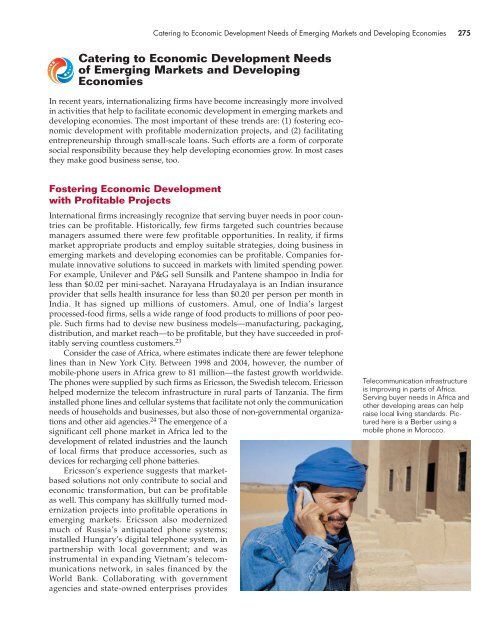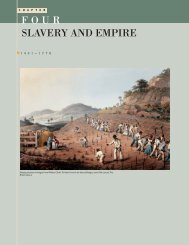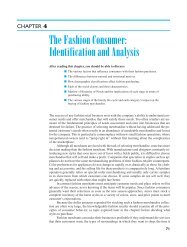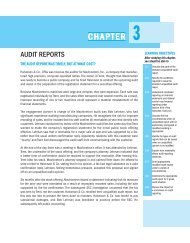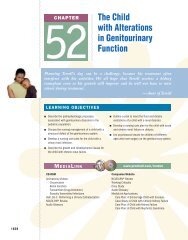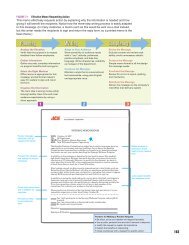Understanding Emerging Markets
Understanding Emerging Markets
Understanding Emerging Markets
Create successful ePaper yourself
Turn your PDF publications into a flip-book with our unique Google optimized e-Paper software.
CAVUMC09_254-283hr 10/15/07 11:23 AM Page 275<br />
Catering to Economic Development Needs of <strong>Emerging</strong> <strong>Markets</strong> and Developing Economies 275<br />
Catering to Economic Development Needs<br />
of <strong>Emerging</strong> <strong>Markets</strong> and Developing<br />
Economies<br />
In recent years, internationalizing firms have become increasingly more involved<br />
in activities that help to facilitate economic development in emerging markets and<br />
developing economies. The most important of these trends are: (1) fostering economic<br />
development with profitable modernization projects, and (2) facilitating<br />
entrepreneurship through small-scale loans. Such efforts are a form of corporate<br />
social responsibility because they help developing economies grow. In most cases<br />
they make good business sense, too.<br />
Fostering Economic Development<br />
with Profitable Projects<br />
International firms increasingly recognize that serving buyer needs in poor countries<br />
can be profitable. Historically, few firms targeted such countries because<br />
managers assumed there were few profitable opportunities. In reality, if firms<br />
market appropriate products and employ suitable strategies, doing business in<br />
emerging markets and developing economies can be profitable. Companies formulate<br />
innovative solutions to succeed in markets with limited spending power.<br />
For example, Unilever and P&G sell Sunsilk and Pantene shampoo in India for<br />
less than $0.02 per mini-sachet. Narayana Hrudayalaya is an Indian insurance<br />
provider that sells health insurance for less than $0.20 per person per month in<br />
India. It has signed up millions of customers. Amul, one of India’s largest<br />
processed-food firms, sells a wide range of food products to millions of poor people.<br />
Such firms had to devise new business models—manufacturing, packaging,<br />
distribution, and market reach—to be profitable, but they have succeeded in profitably<br />
serving countless customers. 23<br />
Consider the case of Africa, where estimates indicate there are fewer telephone<br />
lines than in New York City. Between 1998 and 2004, however, the number of<br />
mobile-phone users in Africa grew to 81 million—the fastest growth worldwide.<br />
The phones were supplied by such firms as Ericsson, the Swedish telecom. Ericsson<br />
helped modernize the telecom infrastructure in rural parts of Tanzania. The firm<br />
installed phone lines and cellular systems that facilitate not only the communication<br />
needs of households and businesses, but also those of non-governmental organizations<br />
and other aid agencies. 24 The emergence of a<br />
significant cell phone market in Africa led to the<br />
development of related industries and the launch<br />
of local firms that produce accessories, such as<br />
devices for recharging cell phone batteries.<br />
Ericsson’s experience suggests that marketbased<br />
solutions not only contribute to social and<br />
economic transformation, but can be profitable<br />
as well. This company has skillfully turned modernization<br />
projects into profitable operations in<br />
emerging markets. Ericsson also modernized<br />
much of Russia’s antiquated phone systems;<br />
installed Hungary’s digital telephone system, in<br />
partnership with local government; and was<br />
instrumental in expanding Vietnam’s telecommunications<br />
network, in sales financed by the<br />
World Bank. Collaborating with government<br />
agencies and state-owned enterprises provides<br />
Telecommunication infrastructure<br />
is improving in parts of Africa.<br />
Serving buyer needs in Africa and<br />
other developing areas can help<br />
raise local living standards. Pictured<br />
here is a Berber using a<br />
mobile phone in Morocco.


